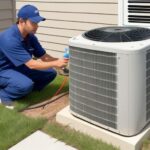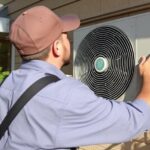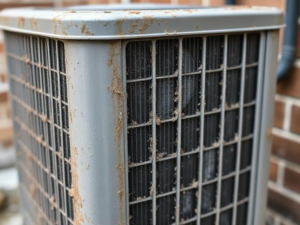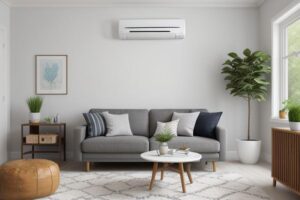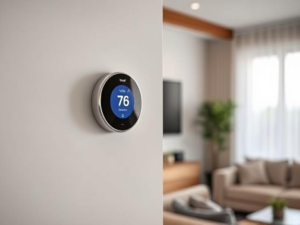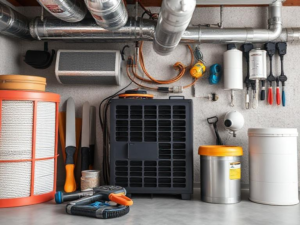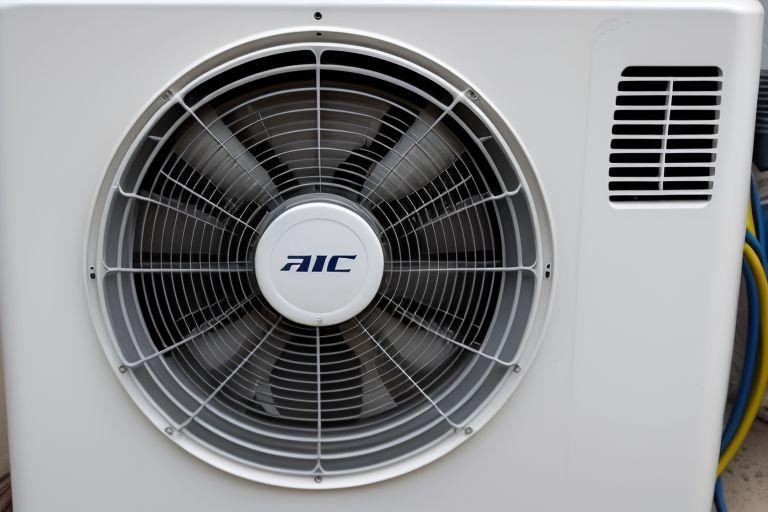
Common AC Problems
The most common air conditioner problems are cycling on and off too frequently, the AC running but not cooling, and the unit making unusual noises. These issues can be caused by clogged air filters, refrigerant leaks, faulty electrical components, or a failing compressor.
To prevent these problems, our HVAC technicians at Anthem Air Conditioning & Plumbing suggest scheduling regular inspections and timely repairs. Understanding the common AC issues can also help avoid costly breakdowns and keep your system running efficiently.
This guide covers the most common AC issues and ways to resolve them. If you are in Indio, CA, give us a call at 760-895-2621 for an inspection.
1. Refrigerant Leaks
Refrigerant is essential for cooling. However, leaks can occur due to worn-out connections, corroded coils, or improper installation. This can cause your AC to blow warm air or struggle to maintain temperatures.
Detecting a refrigerant leak isn’t always easy since the signs such as weak airflow, ice buildup, or a faint hissing sound can be subtle. If you suspect a leak, we suggest contacting an HVAC technician for air conditioner repair service.
To prevent this problem:
- Schedule regular AC inspections to detect leaks early
- Maintain proper refrigerant levels
- Address minor leaks promptly to avoid system strain
Keeping refrigerant levels balanced ensures optimal cooling and reduces unnecessary strain on other AC components.
2. Frozen Evaporator Coils
Airflow restrictions often cause frozen evaporator coils. Dirty air filters, blocked vents, or low refrigerant levels can prevent proper airflow over the evaporator coils and cause them to freeze. When this happens, your AC’s cooling efficiency is significantly reduced.
To prevent this issue:
- Replace air filters regularly to maintain proper airflow
- Keep vents and registers unblocked to allow steady air circulation
- Schedule routine maintenance to check refrigerant levels and airflow issues
If your AC is freezing up, turn it off and let the coils thaw before calling 760-895-2621 for professional service.
3. Sensor Problems
Sensor problems in air conditioning systems, particularly misalignment and calibration issues, can impact their performance and efficiency.
Misaligned Sensors
Misaligned sensors can cause inaccurate temperature readings and make the system work harder than necessary, which leads to higher energy costs. When sensors aren’t correctly positioned, they may fail to monitor the ambient temperature accurately and cause either overcooling or underperformance.
To resolve this, ensure the sensors are aligned correctly, positioned securely, and free from obstructions.
Sensor Calibration Errors
Errors can arise when the sensor is not correctly adjusted to measure temperatures accurately.
Regular maintenance, including sensor calibration by a professional, ensures that the sensors perform correctly over time.
How to Optimize Sensor Performance
To optimize AC sensor performance, verify that the sensors are of the right type for the system, properly installed, and regularly calibrated.
You can also replace sensors with compatible, high-quality options to ensure your AC unit operates at peak efficiency.
4. Thermostat Malfunctions
A faulty thermostat is one of the most common AC problems that can prevent your system from cooling the space. If the thermostat is not reading the temperature accurately or fails to send the correct signals to the AC, the system may short cycle, run continuously, or fail to turn on at all.
Common signs of a faulty thermostat include:
- The air conditioner not responding to temperature adjustments
- The display being blank or unresponsive
- Inconsistent temperatures throughout the home
- The AC turning on and off too frequently
Try adjusting the thermostat settings to ensure it is set to “cool” mode and the temperature is lower than the current room temperature. Replace the batteries if the display is blank or unresponsive.
If your AC has abnormal cooling cycles, contact an HVAC technician to diagnose the problem and replace the thermostat if necessary.
5. Clogged Drain Lines
Dirt, dust, mold, and algae can often accumulate in the drain line, creating blockages and preventing water from draining. This can lead to higher humidity levels, poor cooling performance, and even water damage.
To prevent clogged drain lines:
- Flush the drain line regularly with a mixture of water and vinegar to remove buildup
- Check for clogs and standing water near the drain pan
If a stubborn clog persists, contact a professional to clear the blockage and prevent further damage safely.
6. Dirty Air Filters
Clogged or dirty air filters restrict air flow, forcing your AC to work harder and reducing cooling efficiency. This can lead to higher energy bills, uneven cooling, and poor indoor air quality.
To prevent this issue:
- Replace AC filters every 1-3 months, depending on usage
- Use high-quality filters to trap dust, allergens, and pollutants
- Schedule routine maintenance to ensure filters are clean and functioning properly
A clean air filter will help your HVAC system run smoothly and improve air quality.
7. Electrical Control Failures in the AC System
Over time, electrical components of the air conditioner such as capacitors, relays, contactors, and wiring can wear out or fail, preventing the AC from operating correctly. If any of these components malfunction, the system may fail to start, short cycle, or stop cooling effectively.
Common signs of electrical issues include:
- AC not turning on or randomly shutting off
- Clicking, buzzing, or humming sounds from the outdoor unit
- Frequent tripped circuit breakers
- Fan or compressor not running despite the system being on
Since electrical repairs involve handling high-voltage components, it’s best to call an HVAC technician to diagnose the issue and recommend a solution.
To prevent electrical control failures:
- Avoid frequent thermostat adjustments to reduce unnecessary strain on electrical components
- Schedule routine inspections to check for loose connections, burned-out relays, or failing capacitors
- Ensure proper voltage supply to prevent damage to control boards and motors
- Have a professional inspect and replace worn-out wiring before it leads to a complete system failure
8. Faulty AC Compressor
The AC compressor is responsible for circulating refrigerant and maintaining the cooling cycle. If the compressor fails, the entire system will struggle to function, leading to poor cooling performance or complete system failure.
Signs of a faulty air conditioner compressor include:
- Warm air blowing from vents even when the system is running
- Loud noises such as clicking, rattling, or buzzing from the outdoor unit
- Frequent system shutdowns or failure to start
- High energy bills due to the system working harder to compensate
A compressor is one of the common AC parts that fail due to lack of maintenance, overheating, or low refrigerant levels. Since compressor repairs can be expensive, consulting an HVAC professional to determine whether repair or full system replacement is the best option.
How to Prevent Common Air Conditioning Problems?
- Replace air filters regularly: Dirty filters restrict airflow, reducing efficiency and making your AC system work harder. Change filters every 1–3 months.
- Keep the condenser unit clean: Remove debris, dirt, and leaves from the air conditioning unit to allow proper heat dissipation.
- Schedule annual professional maintenance: A certified technician can inspect for refrigerant leaks, electrical issues, and worn-out parts before they cause major AC repairs.
- Check thermostat settings: Ensure your thermostat is correctly set to “cool” mode and calibrated for accurate temperature readings.
- Inspect and clean evaporator and condenser coils: Dirt buildup on coils reduces cooling efficiency and can lead to frozen coils or overheating.
- Keep vents and ducts unobstructed: Blocked vents and leaks in ductwork can reduce cooling efficiency and strain the AC system.
- Monitor refrigerant levels: Low refrigerant can signal a leak, which should be repaired promptly to prevent compressor damage.
- Listen for unusual noises: Strange sounds like clicking, buzzing, or rattling can indicate loose or failing components in the air conditioning unit.
Call Us Now for Air Conditioning Repair and Maintenance
Regular maintenance helps prevent common problems with air conditioners, but a professional repair may be needed if your system struggles with cooling problems, short cycling, or unusual noises. If your AC is not blowing cold air, call us for a professional inspection and repair service to restore your system’s performance.
At Anthem Air Conditioning and Plumbing, our certified technicians with direct factory training are just a call away. We handle all problems with your HVAC system. We are committed to transparency and clear, upfront pricing, so you always know what to expect—no hidden fees or surprises. With our 100% satisfaction guarantee, you can trust that your AC repair or maintenance service will be done right the first time.
Call 760-895-2621 to schedule an AC inspection in Indio, CA.
Frequently Asked Questions
What is the most common AC repair?
The most common AC problem is restricted airflow due to clogged air filters, dirty coils, or blocked vents. Poor airflow reduces cooling efficiency, forces the system to work harder, and can lead to frozen evaporator coils or compressor failure.
Why is my air conditioner running but not blowing cold air?
Low refrigerant levels, a dirty air filter, thermostat issues, or a frozen evaporator coil can cause the air conditioner to run without cooling. Start by checking the air filter and thermostat settings. If the issue persists, professional AC service may be required to inspect refrigerant levels or diagnose a failing compressor.
What is the lifespan of an AC filter?
The lifespan of an AC air filter depends on usage and indoor air quality. A standard filter should be replaced every 1–3 months, while high-efficiency or HEPA filters can last up to 6 months. Homes with pets, allergies, or high dust levels may need more frequent replacements.
What is the most expensive part of the AC unit to fix?
The compressor is the most expensive AC component to repair or replace, typically costing $1,200–$2,500+ depending on the unit type. Since the compressor is the heart of the cooling system, failure often requires replacing the entire unit, especially if the AC is older.
How often should I schedule professional AC maintenance?
Professional AC maintenance should be scheduled twice a year, ideally in the spring and fall. If you notice reduced airflow, unusual noises, or inconsistent cooling, servicing your system promptly can help prevent unexpected breakdowns.
What can I do to improve AC energy efficiency?
To boost AC energy efficiency, set your thermostat to an optimal temperature, upgrade insulation, and seal any air leaks. Regularly replacing filters and ensuring vents remain unblocked can also help reduce energy consumption.
How do I choose the right size AC unit for my home?
The right AC size depends on square footage, insulation, and climate conditions. An oversized or undersized unit can lead to inefficiency and higher energy costs, so professional load calculations are recommended for proper sizing.
Can plants around my outdoor unit affect its performance?
Yes, plants and other obstructions can restrict airflow and cause your AC to overheat. Keep at least two feet of clearance around the outdoor unit to maintain proper ventilation and prevent strain on the system.
Are there any DIY tips for extending the lifespan of my AC system?
You can extend your AC’s lifespan by changing filters regularly, keeping the outdoor unit clean, and optimizing thermostat settings. Scheduling routine maintenance and addressing minor issues early can also help prevent costly repairs.


